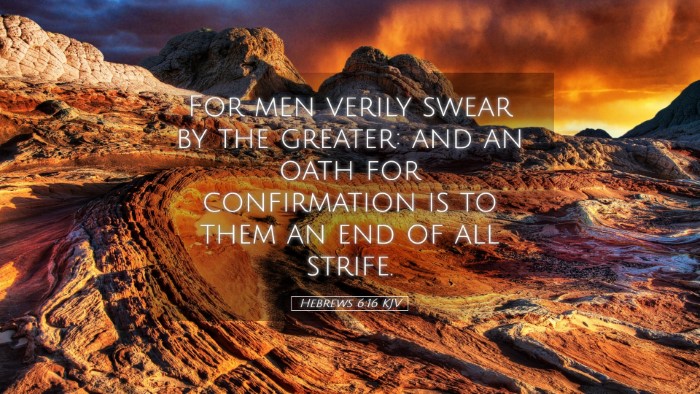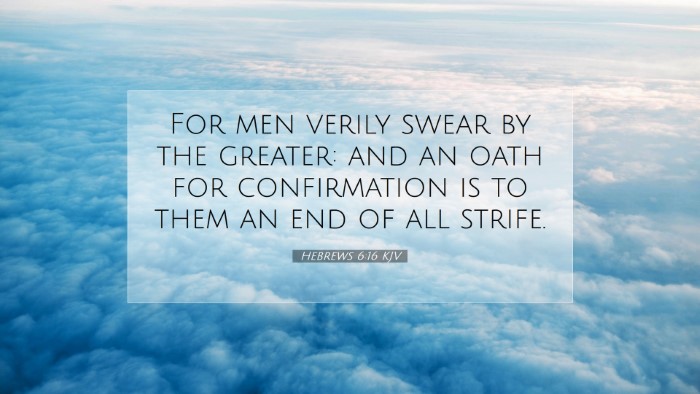Old Testament
Genesis Exodus Leviticus Numbers Deuteronomy Joshua Judges Ruth 1 Samuel 2 Samuel 1 Kings 2 Kings 1 Chronicles 2 Chronicles Ezra Nehemiah Esther Job Psalms Proverbs Ecclesiastes Song of Solomon Isaiah Jeremiah Lamentations Ezekiel Daniel Hosea Joel Amos Obadiah Jonah Micah Nahum Habakkuk Zephaniah Haggai Zechariah MalachiHebrews 6:16
Hebrews 6:16 KJV
For men verily swear by the greater: and an oath for confirmation is to them an end of all strife.
Hebrews 6:16 Bible Commentary
Hebrews 6:16 Commentary
Bible Verse: "For men swear by one greater than themselves, and with them an oath is a confirmation for them as an end of all strife."
This verse serves as a foundational understanding of the role of oaths in human interaction and the nature of God’s promises. The writer of Hebrews employs the principle of oaths to emphasize the unchangeable nature of God's promises to His people.
Contextual Analysis
The context of this verse falls within a broader discussion on the superiority of Christ’s priesthood and the assurance of hope for believers. The author has been warning against apostasy and calling the readers to maturity in faith.
Matthew Henry’s Insights
Matthew Henry elucidates the social customs surrounding swearing oaths. He points out that oaths serve as serious affirmations of truth, as they invoke a higher authority. In this context, the writer contrasts human oaths with divine promises.
- Henry notes that the oath signifies the importance humans place on assurances in disputes and agreements.
- He draws a parallel: just as men take oaths to assure one another, God’s promises, which are even more certain, should instill confidence in believers.
Albert Barnes’ Commentary
Albert Barnes emphasizes that the practice of swearing oaths indicates the necessity of assurance in human relations. He explains that the act of swearing to confirm statements is a reflection of the perceived unreliability of mere words.
- He points out that when humans are in doubt, we call upon a greater authority to ensure credibility, revealing our nature to seek certainty.
- Barnes highlights that the author’s assertion that God never lies elevates the certainty of His promises even higher than human oaths.
Adam Clarke’s Interpretation
Adam Clarke provides a deeper theological reflection on the implications of oaths in divine promises. He states that oaths are established for the sake of human weakness and the presence of doubt among people.
- Clarke mentions that God’s unchangeable nature means that His promises are inherently trustworthy, devoid of need for an oath.
- He infers that the certainty of God's promises is so profound that they require no affirmation beyond His word, which holds that God is beyond question.
Theological Implications
This verse encapsulates fundamental theological themes regarding the nature of God and His relationship with humanity:
- God's Nature: The verse reflects God's unchanging nature and His absolute trustworthiness.
- The Role of Oaths: Oaths highlight human frailty and the need for assurance; they are reminders of our need for confirmation in truth.
- Sovereignty of God: The comparison of human oaths with God's promises illustrates human limitations contrasted with divine supremacy.
Application for Believers
Believers are encouraged to derive hope and assurance from the promises of God. Understanding that God’s word is irrevocable and truthful can strengthen faith during trials.
- Pastors can use this passage to teach congregants about trusting in God’s promises rather than reliance on earthly assurances.
- Students of theology can delve deeper into how God’s nature as immutable undergirds the entirety of scripture and personal faith.
- Theologians can explore the broader implications of divine assurance in context with covenant theology.
Conclusion
Hebrews 6:16 serves as a reminder of the profound nature of God’s promises, employing a familiar human practice of oaths to elucidate the depth of divine commitment. As believers reflect on this truth, they are encouraged to share in the hope found in the steadfastness of God, who is far greater than any worldly certainty.


